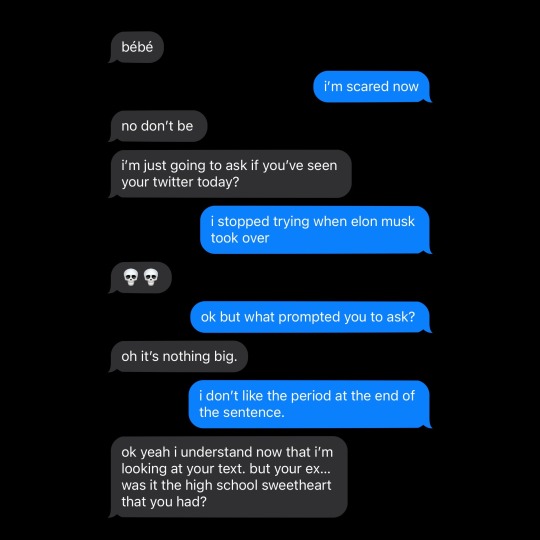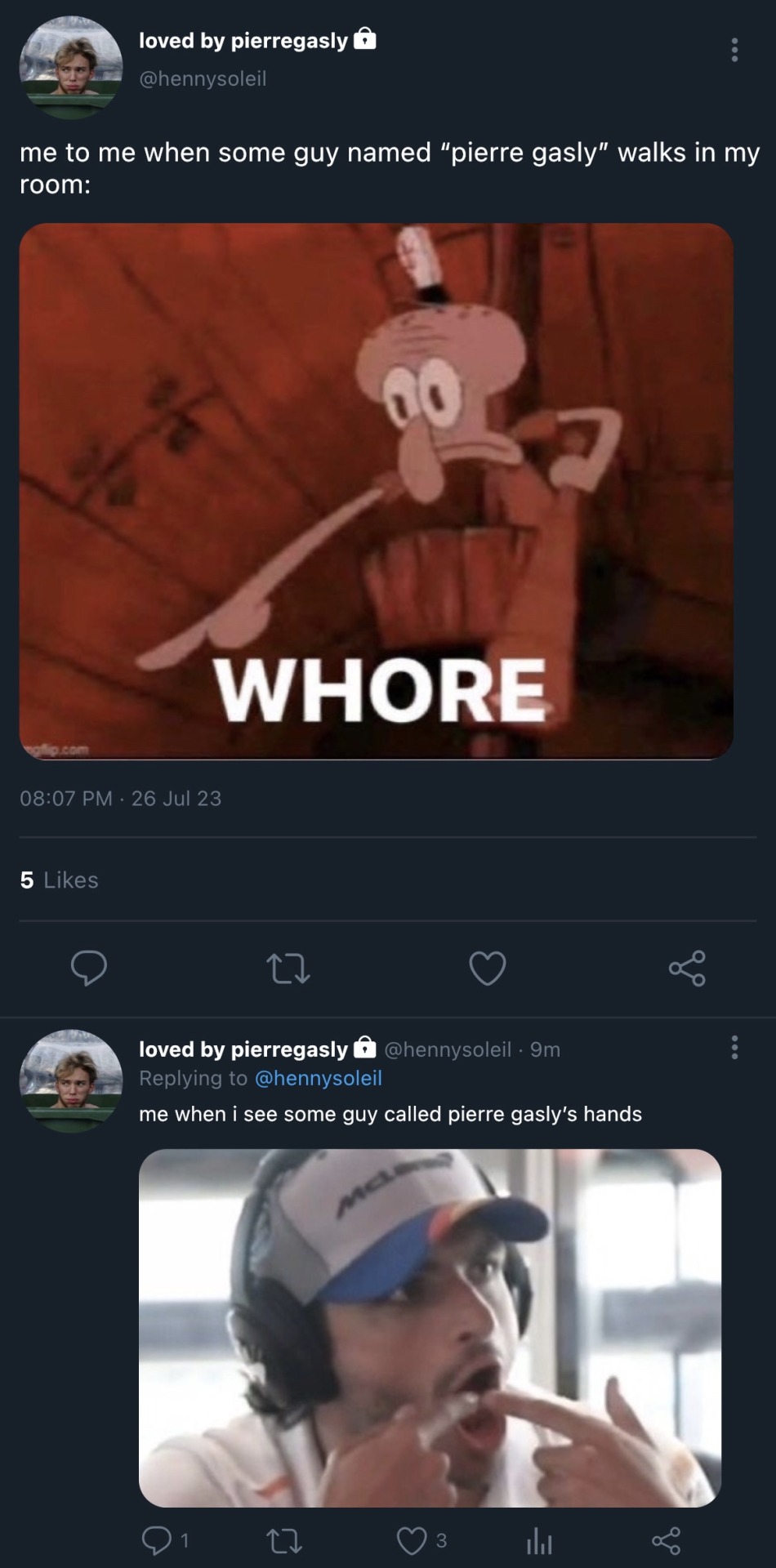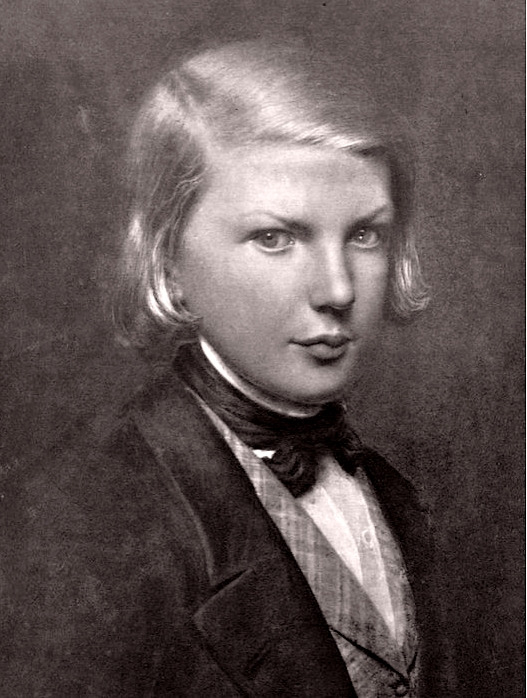#guernsey french
Text
27/03/2024
Souogn n. m.
[swõĩ]
"Care"
N'y a pas d'souogn - No matter/it's fine (lit. There's no care)
Par mànque dé souogn, il en aont fait énne vraie tchérue à tchens - By carelessness, they've made a real mess (lit. dog-drawn plough) of it
4 notes
·
View notes
Text
Parole d'Ogniet Guernésiaise
Guernésiais Word of the Day
02/08/2023
Prumier n. m. & adj.
/prymjɛ/
"First"
Feminine: prumière.
Sen prumier naom - His/her first name
La prumière moignti - The first half
2 notes
·
View notes
Text
indigo ! pierre g. x ofc (singer!ofc)
"first to one-up your last, (s)he can stay in your past."
summary: a certain pierre gasly shouldn't be jealous over a high school sweetheart, and ensley made sure to remind him that. OR no amount of subtweeting from an ex-boyfriend can deter ensley's love for the alpine driver
content warning: ex-boyfriend (fictional), use of explicit language, allusions to smut (no smut, i can't do it guys), slight insecure!pierre, pierre is a boba fan, ofc and other drivers in a private twitter account, pierre and ensley being h0rny on main, chatfic + tweets, rare british youtubers in the comments
note: someone should have the audacity, and it will be ensley and lester :)
masterlist
















tagged ensoleil
liked by willne, landonorris, estebanocon
brianimanuel look at my lil frenchman being cultured and all 💗 liked by pierregasly
user1 "my lil frenchman" 💀
willne i feel like i shouldn't be here
ensoleil we don't recall asking william :)
pierregasly bebe that's not very nice
ensoleil my bad bub sorry william
user2 y'all telling me ensley listens to the person she didn't even like before???
user3 this dump is giving "pierre is an exhibitionist" liked by pierregasly
user3 pierre?! what does that mean?
user4 i need to touch grass (or they do)
user5 pierre's the kind to pull her by the hair then kiss her whenever someone tries to eye her liked by pierregasly
user6 PIERRE PLEASE TOUCH SOME GRASS
landonorris you think this dump is bad try being the photographer of the said photos liked by pierregasly
maxfewtrell i second that
yungfilly i third that
willne so it's not just me?? our group therapy session's about to be mad lads
user7 not the group therapy sesh 😭
charles_leclerc mon dieu, there are kids in this app, calamar 🥲 liked by pierregasly
ensoleil too many to unpack because he packing frfr
charles_leclerc go to church and indulge in some holy water.



tagged pierregasly
liked pierregasly, brianimanuel, willne
user1 "big dick is back in town" 😩
niko do you have that shirt available for me?
ensoleil no sorry, it's only reserved for one man
wroetoshaw oh so you're not even going back to your flat in uk for a frenchman? 😒 liked by ensoleil
ensoleil ain't you french?
wroetoshaw i'm from guernsey?!
ensoleil same thing
willne i thought i lost that shirt 😟
ensoleil it was never urs
estebanocon i already get enough of this in the paddock
ensoleil sorry bestie you'll get more of this in your timeline :)
estebanocon its ok i like you two together anyway
brianimanuel look at our moneymaker 🥰 liked by ensoleil
pierregasly i prefer the word "muse" but thank you bb
yukitsunoda0511 look at our boyfriend liked by ensoleil
ensoleil i know right?!!!
pierregasly i didn't agree to this 😭
pierregasly if he tries to post about you one more time my dump photos will be even worse liked by ensoleil
ensoleil make him cry ig 😩😉
pierregasly oh i will, mon bebe





bonus !!!
JOJI JUDGES ENSLEY AND RICH BRIAN'S HOMEMADE BUBBLE TEA IN THIS FEAST MANSION EPISODE by first we feast






#formula one fanfiction#formula one fic#formula one imagine#formula one x oc#formula one smau#f1 imagine#f1 fic#f1 smau#formula one social media au#formula one ig au#formula one instagram au#f1 instagram au#f1 ig au#f1#f1 x reader#formula 1#pierre gasly instagram au#pierre gasly imagine#pierre gasly smau#pierre gasly fluff#pierre gasly x oc#pierre gasly#pierre gasly x reader#pierre gasly x you#pierre gasly fanfic#pierre gasly social media au#pierre gasly ig au#smau#formula 1 instagram au#formula 1 x reader
350 notes
·
View notes
Text
Laces for a Lady - 18th century poly shifter romance (Part one, sfw)
Disclaimer which I’m including in all my works after plagiarism and theft has taken place: I do not give my consent for my works to be used, copied, published, or posted anywhere. They are copyrighted and belong to me.
Well folks, here it is. You said you were interested, so I hope it meets expectations! Here's part one for you, of a multi part story. If you want to kno wmore about it, you can find some more info here, as well as a little 'mood board'.
Content: sfw, the daughter of a country gentleman from Sussex relocates to a sleepy fishing village in Cornwall in order to become the paid companion of a young widow, and meets some of the locals on her arrival.
Wordcount: 3972

Five and twenty ponies,
Trotting through the dark -
Brandy for the Parson, 'Baccy for the Clerk.
Laces for a lady; letters for a spy,
Watch the wall my darling while the Gentlemen go by!
~ from ‘A Smugglers’ Song’, Rudyard Kipling (1906)
In the cool, lavender light of a late spring dawn, a gaff-rigged cutter drew into the sheltering arms of a small bay at high tide, and quietly dropped anchor. As if the soft splash had awoken him, a cockerel spluttered to life in a farmyard somewhere inland, but most of the villagers were already up and awake and steering their small, secret fleet of boats out from the golden crescent of sand beneath the cliffs to meet the waiting ship fresh from Roscoff.
Beneath the waves, where churning kelp moored itself in unyielding handfuls to the ancient granite of the sea floor, a long, serpentine shadow snaked between the stalks, and the currents of the coastline subtly shifted. Any revenue men trying to sail along the coast from Fowey to catch the smugglers would have found the wind and tide set dead against them, and in the subtle wake that wafted from the mottled, eel-like tail as it passed unseen, the waters of the secluded inlet calmed beneath the keels of the scurrying fishing boats. The drag of the oars through the waves lessened, and muscles already tired from heaving and hefting goods up the cliff moved a fraction easier for the unexpected boon.
Between them over the next hour, the gathered men and women shifted their haul of half anker barrels and dozens of crates and boxes of goods ashore. The small kegs of rich, French cognac would fetch a pretty price all across Cornwall, and along with the liquor came smaller luxuries like lace and silk, and bundles of tobacco and spiced tea, all meticulously wrapped in oil cloth to keep the sea and the salt and the water out.
And when the speedy, slender ship was riding noticeably higher in the water, the locals simply melted away into the countryside like so many mice from a late summer granary before the excise men even knew the ship from Guernsey had visited the cove at all.
Fifteen miles away, as the sun breached the horizon and cast its first rays of warmth along bellies of fleecy clouds and the flanks of blossoming hedgerows below, a stagecoach lurched and rumbled westwards along potholed roads, and a young woman stared out of the grimy window as the horses carried her into a new chapter of her life.
After leapfrogging some two hundred miles or so along the staging stations that dotted the South Coast, with nothing but a small trunk of her belongings and a thrice-read, dog-eared novel for company, Eleanor Bywater was more than ready to see the back of that infernal stagecoach. Had it not been for the small but inconveniently bulky travelling case sitting at her feet, she might have hired a horse and ridden from the last staging inn at Plymouth to reach the secluded fishing village of Polgarrack, but given that the trunk held all her worldly belongings, she had not been quite desperate enough to escape the discomfort of hard seats and poor suspension to abandon it.
Bouncing along in the nearly-empty stagecoach, she studiously tried to ignore the older woman sitting opposite her. She’d stared intently at Nel since they'd left Plymouth behind that morning, and her scrutiny had begun to make that last twenty mile stretch feel much, much longer.
Finally, after jouncing over a pothole deep enough to start prospecting for copper ore at the bottom, Nel gasped and then raised her eyes to meet the woman’s openly curious stare. She found sympathy for her own discomfort, and a small degree of kindly amusement too.
“Where are you headed, miss?” the stranger asked after Nel raised the hint of an eyebrow at her as the silence stretched.
“Polgarrack.”
At that, the woman’s grey eyes narrowed in confusion. “Now what takes a young miss like you to an old fishing village like Polgarrack?”
She looked to be in her fifties, though a life beside the harsh sea had weathered her features somewhat, and her wiry grey hair was covered by a simple linen cap. Her dress was dark and plain, though there was a hint of tired lace around the neck and cuffs. Her hands had the tough, reddened look of someone who scrubbed pots and salted fish, while Nel’s own hands were smooth and soft, if a little ink stained from sending a letter to her friend before leaving the inn that morning.
Nel laughed quietly and shrugged. “There’s no mystery to it,” she said. “I am to be employed as a companion to the widowed Lady Penrose at Heath Top House. I am expected there this afternoon.”
Given that only ladies of relatively high social standing themselves tended to become a ‘lady’s companion’, the older woman made a hasty re-evaluation of her fellow traveller, and her already ruddy cheeks flushed a darker shade as she cleared her throat and looked away.
“Begging your pardon, miss,” she said. “We don’t get many new faces in Polgarrack, is all. I didn’t mean to pry or cause offence with my questions.”
“No harm in a little curiosity,” Nel said, trying to put the stranger at ease to avoid any further awkwardness between them on the remainder of their journey. “I take it you’re from Polgarrack yourself then?”
“Oh, born and raised, miss,” she chortled. She eyed the forest green redingote Nel wore, with its rather masculine high collar, wide lapels and small, gold pocket watch dangling on a chain, and the contrasting sage green skirts beneath, and no doubt made one or two judgements of her own about the young lady. “And yourself? You don’t sound as though you’re from these parts at all, if I may be so bold.”
Nel smiled. “I’ve come from Sussex.”
The woman’s watery, grey-blue eyes widened almost comically and she gasped. “’at's a bloody long way, miss! And all on your own?” She shook her head but remembered herself and mumbled, “Begging your pardon.”
“You’re right,” Nel sighed, letting her gaze slide to the window to watch the countryside roll past in a blur of salt-bleached grass and vibrant yellow gorse flowers. “It is a bloody long way.” And her spine and backside felt every lump and bump and lurch of the stagecoaches from Sussex to Cornwall. With a warmer smile, she turned back to the woman. “My name is Eleanor, but most people call me Nel.”
“Agatha,” she replied with a grandmotherly smile of her own for the young woman. “But everyone calls me Aggie. My husband, Martin, is the village carter and smith, and we’ve got four boys, all of them either fishermen or miners. They all married too, so I’ve got nine grandchildren, if you can believe it!”
Nel offered Aggie her congratulations and another little smile, and then ventured to ask, “Will you tell me a bit about the place? I should like to know more about it, since it is to be my home for the foreseeable future.”
Aggie brightened even more and shuffled her plain, dark skirts, giving a wince and a grunt as the coach lurched over a pothole and the driver cursed audibly above them. Settled, if not entirely comfortable, she began.
“Well, see now. Folks has been fishing these waters for time out of mind. Pilchards is our mainstay, o’course, but the folks over St. Austell way mine clay, and obviously there’s copper and tin mines all over in the north of Cornwall. Mining here is as old as fishing, but it’s starting to dry up here and there now, o’course.”
She barely paused to draw breath before barrelling on, and Nel sat and listened while the older woman talked.
“Now, your Lady Penrose married into the Penrose family — see, she’s from Bath herself originally, though I can’t rightly remember what her family name was, but…” Nel let Agatha's potted history of the fishing and mining community wash over her, paying just enough attention to make polite sounds at the right pauses, but the discomfort of the journey and a decided lack of sleep was beginning to wear her attention span down to a single, fraying thread.
After two hours in the swaying, rolling coach, she felt woozy and weak-stomached, but with Aggie’s near-constant chatter, she at least had a better understanding of the politics of the little village than she’d ever have gained in six months on her own. She’d also learned why Aggie had been in Plymouth, since most folks never had any reason to travel further than the bounds of their own parish. Agatha’s sister’s husband had apparently been killed in the American Revolutionary War some ten years earlier, and since the widow’s health wasn’t the best these days, Aggie made the trip along the coast when she could to see her and take care of her.
Nel’s ticket took her as far as Whitcross, a desolate intersection of paler roads on a clifftop overlooking the tightly-nestled fishing port below, and away across the heather and tufted grass of the heath, she could just see an old manor house in the distance, flanked by tall copper beeches and ash trees. It looked slightly further away than she had anticipated, and she glanced apprehensively down at the travelling trunk at her feet.
Still, she was aching for fresh air and to be free of the sickening motion of the carriage, so she took the driver’s hand and allowed him to guide her safely down onto the hard-packed surface of the road before he lifted her case down for her as well.
From inside, Aggie peered out and scowled disapprovingly. “Now just you wait a moment,” she barked at the driver, who cocked an eyebrow but did pause. “Did they not send someone for you, dearie?” she asked Nel, still leaning out of the doorway and peering about like a disgruntled badger, and using the endearment freely. Apparently, two hours of talking non-stop at Nel had removed any pretence of formality or sense of social distance. Nel might as well have been adopted into Aggie Carter’s family as a niece by that point, and she couldn’t help but smile at the warmth it conjured in her chest.
“I… I never thought that far through,” she admitted, with her hand atop her bonnet as the wind gusted up from the sea below, soaring delightedly over the edge of the cliff and racing on inland as if to continue the momentum of the great rolling breakers that foamed and thundered against the shore. The coachman glanced at his pocket watch and groused something about a schedule that was almost immediately lost to the next inward gust.
“No, no, dearie,” the old woman scoffed. “No, you must come into the village. It’s far too far to go all by yourself, and with that case as well. Here, let me —”
“I can manage the case, I assure you,” Nel said with a gentle smile as Aggie half-toppled, half-leaned out of the coach to pick up the case. “How far is it to the house?”
“Two miles up that hill yonder,” Agatha said, pointing with one gnarled and arthritic finger towards the house on the rise to the north. “Come to the Lantern, and we’ll have one of the lads take you up once you’ve caught your breath.” The Lantern, as Nel now knew thanks to Aggie’s detailed prattling, was the inn at the centre of the village, right on the water near the harbour.
She had been about to protest, but with a sigh, she simply nodded. The constant journeying and jolting had worn her down more than she cared to admit, and while she wasn’t the kind of wallflower she’d met any number of times in London during the Season, a life led mostly indoors with few opportunities for physical activity had not prepared her for a two mile walk in heavy, too-fine clothes, carrying an unwieldy case in gusty conditions. Her family had been invited a number of times to Goodwood House to walk the large park there, and she had frequently ridden a rather spirited mare through the parkland of Lavington Hall with her dear friend William, so she was not entirely unused to the great outdoors, but she did have to admit that her experiences had been rather more curated and sanitised than the wild expanse of heathland visible on all sides of the stagecoach from Whitcross.
“You’re kind, Agatha,” she said, and let the woman heft her case into the otherwise empty coach.
The thing about a tiny village was that an outsider stood out a mile, and a young lady in her mid twenties and dressed in impractical, rich green clothes, stood out like a beacon in a dark night. Everyone turned to watch her as she disembarked from the coach. At home, she had barely garnered a look from anyone. Being the centre of everyone’s curiosity there was novel and, in a word, horrifying.
She almost blurted aloud that one would think she was a revenue man come inspecting for smuggled goods, but she bit it back just in time. Cornwall’s so-called ‘free trade’ and smuggling rackets were absolutely none of her concern as an outsider, infamous though they may be, and it would do her no good to start sticking her nose where it did not belong.
The Lantern was a half-timbered, two-storey building that faced the walled harbour. Its painted sign was peeling and sun-bleached, and it squawked something dreadful as it swung back and forth in the squalling wind. Mullioned windows glinted and shimmered, though the small, diamond panes were caked with a haze of salt spray, and alongside the inn, a hand-cart rumbled down from a narrow side alley towards the harbour beyond, where fishing boats bobbed on their mooring lines at the lapping high tide.
Agatha pushed open the black-painted door but came to an abrupt halt as someone appeared to be leaving the inn at the exact same moment, and nearly barrelled into her and Nel.
“Oh, excuse me,” came a young man’s hoarse tenor, and he stepped aside within the inn’s small porch to allow the two women to enter before he left.
Nel noted briefly that he wore well-made but plain clothes, and carried a hefty looking cane in his left hand, upon which he leaned while he waited for them to pass. He was pale and thin, his undyed linen shirt hanging loosely off his shoulders, and his light brown hair was tied back at the nape of his neck into a horsetail. The moment he met her eye, he inhaled in surprise and almost immediately looked away, his large, dark brown eyes turning shy and uncertain. “M’lady,” he mumbled without looking up.
She didn’t have time to correct him and tell him she had no such title, because the moment she had stepped inside, he was off out into the day beyond, limping markedly on his right leg as he went.
Nel turned back to find Agatha waiting for her, watching. “That there was young Edmund Nancarrow,” she supplied as Nel caught up with her. “Local lad. Lots of Nancarrows in this area,” she chuckled. “Can’t move for tripping over a Nancarrow. He was a shy, skittish thing even before he went off to war in the Colonies and came back with a bad leg,” she added. “But he’s a sweetheart if ever I saw one. Tailor’s ’prentice he is now.”
At that, Nel just nodded. Something in her ached when she realised she probably wouldn’t have much to do with the folk from the village once she was ensconced up at Heath Top House, and she half wised she could. They already sounded far more interesting than the Lady Winnifred Penrose, with whom Nel had only exchanged a short flurry of letters before becoming formally engaged as her ‘companion’.
Still, an unmarried woman of Nel’s age and social standing was considered almost past her prime, and given that the few marriage proposals she had received had faded into the mists of her very early adulthood, she had had to find another respectable way to support herself. Hence, Heath Top House.
Aggie bustled her into the main room of the pub, and their arrival caused a flurry of activity that drew the eyes of a good few patrons.
Seated at the wooden bar inside, hunched over a pewter tankard, sat a tall, bulky man in his late-thirties or early forties, with long, thick, dark grey hair shot through with a shimmer of silver white. He had it tied back off his face in a low ponytail at the nape of his neck and as he turned to regard Nel’s arrival, she met unusually deep green eyes surrounded by a web of crows’ feet lines in a tanned, weathered face. His scowl was dark and full of suspicion, but even the storm clouds in his expression couldn’t mask the fact that he was handsome, in a rugged, rough-hewn kind of way.
When she saw where Nel’s attention had snagged, Aggie let out a little gasp and snatched her by the upper arm to steer her towards an empty table in a bay window, about as far from the wooden bar where the man still sat and glared at them as it was possible to be.
“And that’s Locryn Trevethan,” Aggie hissed as she saw Nel settled into a seat. “Can’t say as I’ve seen him in here more than a handful of times this year though. He’s usually out on the water. Lives alone in an old stone cottage round the bay from here, up at Pilchard Sands. You’d probably best be giving him a wide berth, miss. Not that he should give you any trouble, mind,” she amended carefully, “But he’s not for the likes of you to go mingling with.”
Nel smiled at the protective tone in the older woman’s voice, and nodded once.
With her warning given, Aggie raised her voice and called over to the old man behind the bar. “’ere, Tom! This young lady needs a ride up to Heath Top. You think you can arrange that for her?”
The stoop-shouldered, white-haired man nodded and knuckled his forehead at Nel across the space. “Not the finest, but we got a cart.”
“If you have a horse, I could ride,” she said, trying to be helpful.
“Ain’t got a saddle for a lady,” he said regretfully.
Memories of galloping through the leafy trees of Lavington Hall’s parkland with William flashed across her mind and she suppressed a smile. She certainly hadn’t ridden the grey mare side-saddle while keeping up with her childhood friend, and although it had been a year or so since she’d sat astride a horse instead of side-saddle, she thought she could manage well enough. “I know how to ride a man’s saddle,” she said, “But I do have a travel case I’d need to send someone back for.”
“I could get one of the lads to bring that up for you after,” said Tom, “But it’s almost as much effort to hitch up a cart as it is to tack up a horse for riding, ma’am.”
“Whatever is the least trouble for you will do fine,” she said, and the stoic, weather-beaten old man’s red cheeks darkened and he ducked his head.
While Tom left to sort out transportation to the house, Aggie flapped about getting some refreshments for Nel, leaving her to wait at the table alone.
In the wake of the hubbub and pother Agatha left behind her, Nel took a long, deep breath looked around to find Locryn Trevethan still staring across the room at her. Taken aback by his directness and the intensity of his glare, she tried to smile, but his expression remained thunderous beneath strong, dark brows, and she quickly looked away, embarrassed.
In a face turned to leather by the sun and sea-wind, wide cheekbones and a heavy brow framed his piercingly green eyes. Never mind that marked crow’s feet around his eyes that made him look like he would rather have been laughing; the contrast between the dark, hostile glower and the soft laughter lines unnerved her and made her feel off-balance, as though her stranger’s presence in their local pub had unknowingly raised the ire of a usually gentle man.
He had a short, neatly-trimmed, salt-and-pepper beard around full lips that were currently turned down at the corners and which bore a silver-pink scar across the middle. Despite the warm day, he wore a fisherman’s dense, woollen sweater, and when she risked another look back at him, she found him still frowning openly across the bar at her.
Nel didn’t relax until Aggie returned, at which point the man snapped abruptly out of his trance, slammed a coin down on the bar, and strode from the pub on long legs that were thick as tree trucks at the thigh. The door bounced back off the plasterwork in his wake and his boots rang on the flagstones outside.
“Not one to welcome strangers, I take it,” Nel muttered, and downed half of the cheap, watered-down wine that Agatha had set on the table for her.
“Oh don’t you pay him no mind, miss,” Aggie scoffed, settling herself down into the seat opposite her like a brooding hen and glaring at the pub door. “He don’t seem to like no one in Polgarrack save for sweet Ned Nancarrow, strangely enough. Then again, I ain’t met no one who’s taken a disliking to sweet Ned. Now, Tom will have the horse and cart ready for you in just a moment, but you just take your time and recover after your journey.”
Nel, who had felt ten times better the moment she’d taken her first proper lungful of sea air on stepping out of the swaying stagecoach, looked across the table into the older woman’s face and found a mother’s kindness and compassion in her wrinkled face, and something twisted in her gut. “You’re very kind,” she whispered, unable to muster anything more. “Thank you.”
She chuckled. “You know, and don’t you take this amiss, but you remind me of my niece a little, though she’s a little younger than you.”
Nel’s eyebrows twitched in wry amusement, and Agatha blushed at the impropriety of her words. Nel didn’t get the chance to reassure her because Tom shuffled back in and told her the cart was ready for her.
She laid a coin on the table for the wine and stood, following the innkeep out into the yard and clambering up with her case into the back of the cart. It was hardly a very dignified mode of transport for someone of her station, and when Tom said as much while they rumbled out of the inn’s yard, Nel just laughed and said she didn’t mind.
“Anything is better than that awful rolling stagecoach,” she beamed, and swung her legs back and forth like a child off the back of the cart bed while Tom clucked his tongue at the horse to hurry up.
As they trundled up the narrow, cobbled street from the harbour, they passed Edmund Nancarrow standing outside a tailor’s shop, talking with the beast of a man from the bar. Both men looked up and watched her pass like she was some kind of rare spectacle.
In a way, she supposed she was.
Still, she smiled at them despite her nerves, and Edmund knuckled a non-existent cap at her with a shy smile, while Locryn just glared.
She sighed and wondered what this next chapter in her life would bring.
___
Next chapter ->
Well, what did you think of it so far? I can't wait to hear your thoughts on it, as always!
I hope you’ll consider reblogging as well as leaving a like if you enjoyed it. Take care, and I hope you have a lovely day/night wherever you are, and whenever you read this.
| Masterlist | Ko-fi (tip jar)
#selkie#bucca#polyamory#polyamorous romance#poly story#o#historical fantasy#shifter romance#poly shifter romance#18th century romance#shapeshifter romance#m/m/f
236 notes
·
View notes
Text
National personification
The UK has Britannia. France has Marianne. The US have Uncle Sam. National personifications, summing up supposed collective qualities and passing on a message, both to citizens and foreigners alike. Instantly recognizable by just about anyone. To be found everywhere, from city halls (busts, frescoes, tapestries) to subway walls (Army conscription posters - of course it rings a bell!).
Romania has this:

This is Revolutionary Romania, as seen by C.D. Rosenthal, an Austrian painter who found both friendship and an avid clientele among the Romanian young rebels who tried and failed to overthrow the corrupted Ottoman rule, in 1848. Following them in exile and probably also spying on their behalf, Rosenthal was finally arrested in Budapest and tortured to death by the Imperial authorities: a normal occurrence in troubled times. His memory went on and on and on, because the same friends were soon to come back home and become ministers, bankers, newspaper owners: a modern democracy slowly emerged.
This is his most famous portrait and it quickly became our Britannia of sorts. Ceaușescu had it placed in his office, for inspiration - it did not help much, though.
The woman painted by Rosenthal holds the red, yellow and blue flag and is dressed in a Southern peasant costume, as it was worn at the time. She gazes with strength, determination and confidence towards a future that spells free press, parliamentary elections, industrialization and capitalist speculation. In real life, she is Maria Rosetti, a personal friend and sponsor of his. The wife of C.A. Rosetti, an authentic Prince of Genoese and Greek stock, one of the leaders of both the rebellion and the future Liberal Party. Also a many times removed relative of this blogger - but let's not insist. 😉
There is a catch, however, in all this fine and dandy story. Our national personification, the woman I just mentioned, is Scottish. Her life begins in Guernsey in 1819, as Marie Grant, the daughter of Captain Edward Grant, a ship-owner businessman and member of the Clan Grant of Carron and Spey and Marie La Lacheur, a French Huguenot woman.
These people, who fought as Jacobites at Prestonpans and Culloden and whose motto was 'Stand Fast':


Marie came to Wallachia, or what is now the Southern part of Romania, around 1837, following her younger brother, Effingham Grant, who just managed to find a lucrative job as the private secretary of another Scot (Glaswegian, even), Robert Gilmour Colquhoun, the newly appointed British Consul-General. At the time, these were long term postings, not unlike a long sojourn on a space station of sorts: Colquhoun remained in Bucharest from 1835 to 1854, when he eventually was posted to Bosnia.
Because she needed to support herself, Marie found a well paid live-in job as a governess for the family of Ion Odobescu, a high ranking Police honcho (also a far removed relative, this time on my maternal grandmother's side - the world is really, really small). The rest was easy enough: having met Rosetti through her brother, they fell in love, eloped to Plymouth and got married there, for what was to become a life long equal political and business partnership. Because they owned several newspapers, she is our first female journalist. A truly remarkable woman, a philanthropist and an indispensable voice advocating for the dispossessed. Effingham went on to establish the biggest foundry in the country, along with a real estate company, a tobacco manufacture, an orchid greenhouse and a bread factory - all prospered beyond any expectations. A heavy traffic steel bridge in Bucharest still bears his name. Enduring legacies.
For those brave enough or bored enough to look for more, here is the best detailed account on her I could find, based on Guernsey sources (but not only): https://www.priaulxlibrary.co.uk/node/386 .
36 notes
·
View notes
Note
hey!
would you be able to suggest some male actors of latina / south american descent? preferably in their twenties?
thank you <3
below are some SOUTH AMERICAN face claims, in their 20s. they are listed in alphabetical order, with their birth years && ethnicities. those in bold are my personal recommendations. please LIKE / REBLOG if you find this useful.
alejandro speitzer (1995, mexican && unspecified other)
andrew matarazzo (1997, brazilian, italian && unspecified other)
benjamin wadsworth (1999, mexican, iranian, swedish, dutch && english)
booboo stewart (1994, argentinian, italian, french-canadian, english, scottish, japanese, chinese && korean)
chance perez (1997, mexican, english && irish)
d’pharaoh woon-a-tai (2001, oji-cree, guyanese, english, irish, german, dutch, chinese && african)
diego tinoco (1997, mexican && colombian)
eduardo franco (1994, mexican)
froy gutierrez (1998, mexican, caxcan && unspecified white)
gabriel conte (1994, cuban && colombian)
gavin leatherwood (1994, mexican, irish, british, german && cherokee)
jake t. austin (1994, puerto rican, argentinian, spanish, polish, english && irish)
lino facioli (2000, brazilian, austrian, italian, portuguese && german)
matt hunter (1998, colombian, scottish && italian)
michael garza (2000, mexican)
nico greetham (1995, colombian && scottish)
noah urrea (2001, mexican, dutch/frisian, english, scottish && german)
omar rudberg (1998, venezuelan)
ricardo hoyos (1995, ecuadorian, peruvian, irish, british, french-canadian && guernsey)
william shewfelt (1995, guyanese, indian && german)
xolo maridueña (2001, cuban, ecuadorian && mexican)
#face help#fc help#face claim help#underused fc#rp help#rph#poc fc#male fc#latino fc#latin fc#south american fc#mexican fc#colombian fc#venezuelan fc#ecuadorian fc#guyanese fc#cuban fc#chilean fc#argentinian fc#brazilian fc
74 notes
·
View notes
Text
Les Mis Letters: Preface
Tant qu'il existera, par le fait des lois et des mœurs, une dam- nation sociale créant artificiellement, en pleine civilisation, des enfers, et compliquant d’une fatalité humaine la destinée qui est divine ; tant que les trois problèmes du siècle, la dégradation de l’homme par le prolétariat, la déchéance de la femme par la faim, l’atrophie de l’en- fant par la nuit, ne seront pas résolus ; tant que, dans de certaines régions, l’asphyxie sociale sera possible ; en d’autres termes, et à un point de vue plus étendu encore, tant qu’il y aura sur la terre ignorance et misère, des livres de la nature de celui-ci pourront ne pas être inutiles.
-Hauteville-House, 1862.
(from this very nice French edition! thank you, @everyonewasabird , for the link!)
Hello everyone in the Les Mis Letters/Les Mis Daily tag! I'm going to be trying to use this year's readalong to work on my French a little -- I absolutely am not up to reading the whole Brick in French, but I'm hoping doing a little comparison reading every day will be good practice to help me get there!
(Fair warning: I'll be keeping my posts in the Les Mis Letters and Les Mis Daily tags spoiler free, or else spoilertagging intensively if necessary, but I've been posting about this book for ..oh no a decade now..and most of my blog is not spoiler free, nor tagged for it, at all.)
It occured to me while I was looking for an online French edition with this quote that the first translation I read of LM was FMA, which includes a decent, if necessarily brief, capsule bio on Hugo, and explained Why the heck one of the most Parisian authors ever was writing from Guernsey (Hauteville House). I may not have been able to really understand the context of the political revolutions in France back then (it was...longer than 10 years ago XD) but at least I knew he was in political exile!
But neither the French original nor the first English translations (Wilbour, Hapgood, assorted others) made mention of it. Which makes sense! They didn't have to! Because Hugo's exile was famous, his then-established role as a republican figurehead and organizer as well known as his writing-- inextricable from his writing at that point, really, with the publication of Les Chatiments. Anyone reading Hugo at that point would entirely have been looking to see a political lens in his work ; even if Hugo hadn't wanted to deal with social issues at all (and of course he did want to!) , just needing to get past the censors of the 2nd Empire would inevitably require an eye to the possible political readings of his novel, and how to pass them by the censor's shears or flat-out bans.
But that was 150+ years ago. These days even a pretty decent bio of Hugo might leave the immediate political context around the writing of LM underexplored, just because really exploring it would take So Much time.
But here with Hapgood, as with the original French, the whole thing can be summed up with "Hautevile-House, 1862"-- the simple fact that France's famous author is not writing from France.
60 notes
·
View notes
Text
Kraken
The kraken is a legendary sea monster of enormous size said to appear off the coasts of Norway.
Kraken, the subject of sailors' superstitions and mythos, was first described in the modern age at the turn of the 18th century, in a travelogue by Francesco Negri in 1700. This description was followed in 1734 by an account from Dano-Norwegian missionary and explorer Hans Egede, who described the kraken in detail and equated it with the hafgufa of medieval lore.

However, the first description of the creature is usually credited to the Norwegian bishop, Pontoppidan (1753). Pontoppidan was the first to describe the kraken as an octopus (polypus) of tremendous size, and wrote that it had a reputation for pulling down ships. The French malacologist, Denys-Montfort, of the 19th century is also known for his pioneering inquiries into the existence of gigantic octopuses.
The great man-killing octopus entered French fiction when novelist Victor Hugo (1866) introduced the pieuvre octopus of Guernsey lore, which he identified with the kraken of legend. This led to Jules Verne's depiction of the kraken, although Verne did not distinguish between squid and octopus.
The legend of the Kraken may have originated from sightings of giant squid, which may grow to 12–15 m (40–50 feet) in length.
The English word "kraken" (in the sense of sea monster) derives from Norwegian kraken or krakjen, which are the definite forms of krake.
According to a Norwegian dictionary, krake, in the sense of "malformed or crooked tree" originates from Old Norse kraki, meaning "pole, stake". And krake in the sense of "sea monster" or "octopus" may share the same etymology. Swedish krake for "sea monster" is also traced to krake meaning "pole".
However, Finnur Jónsson remarked that the krake also signified a grapnel (dregg) or anchor, which readily conjured up the image of a cephalopod. He also explained the synonym of krake, namely horv was an alternate form of harv 'harrow' and conjectured that this name was suggested by the inkfish's action of seeming to plow the sea.
Shetlandic krekin for "whale", a taboo word, is listed as etymologically related.
Some of the synonyms of krake given by Erik Pontoppidan were, in Danish: søe-krake, kraxe, horv, krabbe, søe-horv, anker-trold.
The form krabbe also suggests an etymological root cognate with the German verb krabbeln 'to crawl".
The first description of the krake as "sciu-crak" was given by Italian writer Negri in Viaggio settentrionale (Padua, 1700), a travelogue about Scandinavia. The book describes the sciu-crak as a massive "fish" which was many-horned or many-armed. The author also distinguished this from a sea-serpent.
The kraken was described as a many-headed and clawed creature by Egede (1741), who stated it was equivalent to the Icelanders' hafgufa, but the latter is commonly treated as a fabulous whale. Erik Pontoppidan (1753) who popularized the kraken to the world noted that it was multiple-armed according to lore, and conjectured it to be a giant sea-crab, starfish or a polypus (octopus). Still, the bishop is considered to have been instrumental in sparking interest for the kraken in the English-speaking world, as well as becoming regarded as the authority on sea-serpents and krakens.
Although it has been stated that the kraken (Norwegian: krake) was "described for the first time by that name" in the writings of Erik Pontoppidan, bishop of Bergen, in his Det første Forsøg paa Norges naturlige Historie "The First Attempt atNatural History of Norway" (1752–53), a German source qualified Pontoppidan to be the first source on kraken available to be read in the German language. A description of the kraken had been anticipated by Hans Egede.
Denys-Montfort (1801) published on two giants, the "colossal octopus" with the enduring image of it attacking a ship, and the "kraken octopod", deemed to be the largest organism in zoology. Denys-Montfort matched his "colossal" with Pliny's tale of the giant polypus that attacked ships-wrecked people, while making correspondence between his kraken and Pliny's monster called the arbor marina. Finnur Jónsson (1920) also favored identifying the kraken as an inkfish (squid/octopus) on etymological grounds.
The krake (English: kraken) was described by Hans Egede in his Det gamle Grønlands nye perlustration (1729; Ger. t. 1730; tr. Description of Greenland , 1745), drawing from the "fables" of his native region, the Nordlandene len of Norway, then under Danish rule.
According to his Norwegian informants, the kraken's body measured many miles in length, and when it surfaced it seemed to cover the whole sea, and "having many heads and a number of claws". With its claws it captured its prey, which included ships, men, fish, and animals, carrying its victims back into the depths.
Egede conjectured that the krake was equitable to the monster that the Icelanders call hafgufa, but as he has not obtained anything related to him through an informant, he had difficuty describing the latter.
According to the lore of Norwegian fishermen, they can mount upon the fish-attracting kraken as if it were a sand-bank (Fiske-Grund 'fishing shoal'), but if they ever had the misfortune to capture the kraken, getting it entangled on their hooks, the only way to avoid destruction was to pronounce its name to make it go back to its depths. Egede also wrote that the krake fell under the general category of "sea spectre" (Danish: søe-trold og [søe]-spøgelse), adding that "the Draw" (Danish: Drauen, definite form) was another being within that sea spectre classification.
Pontoppidan wrote of a possible specimen of the krake, "perhaps a young and careless one", which washed ashore and died at Alstahaug in 1680.[70][68] He observed that it had long "arms", and guessed that it must have been crawling like a snail/slug with the use of these "arms", but got lodged in the landscape during the process. 20th century malacologist Paul Bartsch conjectured this to have been a giant squid, as did literary scholar Finnur Jónsson.
However, what Pontoppidan actually stated regarding what creatures he regarded as candidates for the kraken is quite complicated.
Pontoppidan did tentatively identify the kraken to be a sort of giant crab, stating that the alias krabben best describes its characteristics.
However, further down in his writing, compares the creature to some creature(s) from Pliny, Book IX, Ch. 4: the sea-monster called arbor, with tree-branch like multiple arms, complicated by the fact that Pontoppidan adds another of Pliny's creature called rota with eight arms, and conflates them into one organism. Pontoppidan is suggesting this is an ancient example of kraken, as a modern commentator analyzes.
Pontoppidan then declared the kraken to be a type of polypus (octopus) or "starfish", particularly the kind Gesner called Stella Arborescens, later identifiable as one of the northerly ophiurids or possibly more specifically as one of the Gorgonocephalids or even the genus Gorgonocephalus (though no longer regarded as family/genus under order Ophiurida, but under Phrynophiurida in current taxonomy).
This ancient arbor (admixed rota and thus made eight-armed) seems an octopus at first blush but with additional data, the ophiurid starfish now appears bishop's preferential choice.
The ophiurid starfish seems further fortified when he notes that "starfish" called "Medusa's heads" (caput medusæ; pl. capita medusæ) are considered to be "the young of the great sea-krake" by local lore. Pontoppidan ventured the 'young krakens' may rather be the eggs (ova) of the starfish. Pontopiddan was satisfied that "Medusa's heads" was the same as the foregoing starfish (Stella arborensis of old), but "Medusa's heads" were something found ashore aplenty across Norway according to von Bergen, who thought it absurd these could be young "Kraken" since that would mean the seas would be full of (the adults). The "Medusa's heads" appear to be a Gorgonocephalid, with Gorgonocephalus spp. being tentatively suggested.
In the end though, Pontoppidan again appears ambivalent, stating "Polype, or Star-fish [belongs to] the whole genus of Kors-Trold ['cross troll'], .. some that are much larger, .. even the very largest.. of the ocean", and concluding that "this Krake must be of the Polypus kind". By "this Krake" here, he apparently meant in particular the giant polypus octopus of Carteia from Pliny, Book IX, Ch. 30 (though he only used the general nickname "ozaena" 'stinkard' for the octopus kind).
In 1802, the French malacologist Pierre Denys-Montfort recognized the existence of two "species" of giant octopuses in Histoire Naturelle Générale et Particulière des Mollusques, an encyclopedic description of mollusks.
The "colossal giant" was supposedly the same as Pliny's "monstrous polypus", which was a man-killer which ripped apart (Latin: distrahit) shipwrecked people and divers. Montfort accompanied his publication with an engraving representing the giant octopus poised to destroy a three-masted ship.
Whereas the "kraken octopus", was the most gigantic animal on the planet in the writer's estimation, dwarfing Pliny's "colossal octopus"/"monstrous polypus", and identified here as the aforementioned Pliny's monster, called the arbor marinus.
Montfort also listed additional wondrous fauna as identifiable with the kraken. There was Paullini's monstrum marinum glossed as a sea crab (German: Seekrabbe), which a later biologist has suggested to be one of the Hyas spp. It was also described as resembling Gesner's Cancer heracleoticus crab alleged to appear off the Finnish coast. von Bergen's "bellua marina omnium vastissima" (meaning 'vastest-of-all sea-beast'), namely the trolwal ('ogre whale', 'troll whale') of Northern Europe, and the Teufelwal ('devil whale') of the Germans follow in the list.
It is in his chapter on the "colossal octopus" that Montfort provides the contemporary eyewitness example of a group of sailors who encounter the giant off the coast of Angola, who afterwards deposited a pictorial commemoration of the event as a votive offering at St. Thomas's chapel in Saint-Malo, France. Based on that picture, Montfort drew a "colossal octopus" attacking a ship, and included the engraving in his book. However, an English author recapitulating Montfort's account of it attaches an illustration of it, which was captioned: "The Kraken supposed a sepia or cuttlefish", while attributing Montfort.
Hamilton's book was not alone in recontextualizing Montfort's ship-assaulting colossal octopus as a kraken, for instance, the piece on the "kraken" by American zoologist Packard.
The Frenchman Montfort used the obsolete scientific name Sepia octopodia but called it a pouple, which means "octopus" to this day; meanwhile the English-speaking naturalists had developed the convention of calling the octopus "eight-armed cuttle-fish", as did Packard and Hamilton, even though modern-day speakers are probably unfamiliar with that name.
Having accepting as fact that a colossal octopus was capable of dragging a ship down, Montfort made a more daring hypothesis. He attempted to blame colossal octopuses for the loss of ten warships under British control in 1782, including six captured French men-of-war. The disaster began with the distress signal fired by the captured ship of the line Ville de Paris which was then swallowed up by parting waves, and the other ships coming to aid shared the same fate. He proposed, by process of elimination, that such an event could only be accounted for as the work of many octopuses. But it has been pointed out the sinkings have simply been explained by the presence of a storm, and Montfort's involving octopuses as complicit has been characterized as "reckless falsity".
The Niagara sighting. 60-metre (200 ft) creature allegedly seen afloat in 1813, depicted as octopus by a naturalist
It has also been noted that Montfort once quipped to a friend, DeFrance: "If my entangled ship is accepted, I will make my 'colossal poulpe' overthrow a whole fleet".
The ship Niagara on course from Lisbon to New York in 1813 logged a sighting of a marine animal spotted afloat at sea. It was claimed to be 60 m (200 feet) in length, covered in shells, and had many birds alighted upon it.
Samuel Latham Mitchill reported this, and referencing Montfort's kraken, reproduced an illustration of it as an octopus.
As to the iconography, Denys-Montfort's engraving of the "colossal octopus" is often shown, though this differs from the kraken according to the French malacologist, and commentators are found characterizing the ship attack representing the "kraken octopod".
And after Denys-Monfort's illustration, various publishers produced similar illustrations depicting the kraken attacking a ship.
Whereas the kraken was described by Egede as having "many Heads and a Number of Claws", the creature is also depicted to have spikes or horns, at least in illustrations of creatures which commentators have conjectured to be krakens. The "bearded whale" shown on an early map is conjectured to be a kraken perhaps. Also, there was an alleged two-headed and horned monster that beached ashore in Dingle, Co. Kerry, Ireland, thought to be a giant cephalopod, of which there was a picture/painting made by the discoverer. He made a travelling show of his work on canvas, as introduced in a book on the kraken.
While Swedish writer Olaus Magnus did not use the term kraken, various sea-monsters were illustrated on his famous map, the Carta marina (1539). Modern writers have since tried to interpret various sea creatures illustrated as a portrayal of the kraken.
Olaus gives description of a whale with two elongated teeth ("like a boar's or elephant's tusk") to protect its huge eyes, which "sprouts horns", and although these are as hard as horn, they can be made supple also. But the tusked form was named "swine-whale", and the horned form "bearded whale" by Swiss naturalist Gesner, who observed it possessed a "starry beard" around the upper and lower jaws. At least one writer has suggested this might represent the kraken of Norwegian lore.
Another work commented less discerningly that Olaus's map is "replete with imagery of krakens and other monsters".
Ashton's Curious Creatures (1890) drew significantly from Olaus's work and even quoted the Swede's description of the horned whale. But he identified the kraken as a cephalopod and devoted much space on Pliny's and Olaus's descriptions of the giant "polypus", noting that Olaus had represented the kraken-polypus as a crayfish or lobster in his illustrations, and reproducing the images from both Olaus's book and his map. In Olaus book, the giant lobster illustration is uncaptioned, but appears right above the words "De Polypis (on the octopus)", which is the chapter heading. Hery Lee was also of the opinion that the multi-legged lobster was a misrepresentation of a reported cephalopod attack on a ship.
The legend in Olaus's map fails to clarify on the lobster-like monster "M", depicted off the island of Iona. However, the associated writing called the Auslegung adds that this section of the map extends from Ireland to the "Insula Fortunata". This "Fortunate Island" was a destination on St. Brendan's Voyage, one of whose adventures was the landing of the crew on an island-sized monstrous, as depicted in a 17th century engraving; and this monstrous fish, according to Bartholin was the aforementioned hafgufa, which has already been discussed above as one of the creatures of lore equated with kraken.
The piece of squid recovered by the French ship Alecton in 1861, discussed by Henry Lee in his chapter on the "Kraken", would later be identified as a giant squid, Architeuthis by A. E. Verrill.
After a specimen of the giant squid, Architeuthis, was discovered by Rev. Moses Harvey and published in science by Professor A. E. Verrill, commentators have remarked on this cephalopod as possibly explaining the legendary kraken.
An ancient, giant cephalopod resembling the legendary kraken has been proposed as responsible for the deaths of ichthyosaurs during the Triassic Period. This theory has met with severe criticism.
22 notes
·
View notes
Text
new and edited version of the list of anthems I know the lyrics of by now:
‘know’ means I could properly sing it with everyone at a sporting event - so for most of them it’s just the first verse and chorus.
* means I know more than that
() means it’s a dependency/territory so not technically a ‘national’ anthem
I’ll also count anthems that don’t have official lyrics if I can whistle them in full
Germany
UK
France
Italy
Canada (both English and French)
Austria
Switzerland (only German)
Uruguay*
Belgium (only French)
(Aruba)*
Spain
Australia
Aotearoa (both English and Te Reo)
Sweden
Finland (only Finnish)
Iceland
Denmark
Norway
(French Polynesia)
Liechtenstein
(Guernsey)
(Scotland)*
Brazil*
Ghana
Mexico
Cuba
(Wales)*
Monaco
Togo
Japan
Haiti*
Jamaica*
Nigeria
Portugal
Saint Kitts and Nevis
Papua New Guinea
(US Virgin Islands)
Fiji
Namibia
South Africa
Argentina*
Mauritius
Chile
Central African Republic
Nepal
Czechia
Slovakia
Albania
Netherlands
Slovenia
Croatia
Romania
#main anthem post#ollie's log#fun with anthems#original tags:#the reblogging to add new ones under a post with a readmore where you can't actually see anything easily didn't work for me#so now I'll just edit and reblog this post whenever I can add a new one to the list#currently I'm still struggling with two lines of the portuguese anthem that just don't want to stay in my brain#because they're just really NOT intuitive even if you know what the words are#I had similar problems with the brazilian anthem#must be the language...#anyway not really sure what I want to tackle next#probably some that are in english but whose melody I can't recognize yet#like papua new guinea or namibia or st kitts and nevis or something...#original tags end
15 notes
·
View notes
Note
parchment, sense, 1975 for the ask game! (you reblogged it to your has-a-thought blog but there isn't an ask box on that one)
Parchment - favourite book
AGGHH MACK I DONT KNOOOWW????? Errrrmmm ella minnow pea is great, babel is probably going to be one when i finish it! Lotr?? The guernsey literary and potato peel pie society!!! (PLEASE READ OR WATCH IT ITS BRILLIANT!!!!!!) Good omens! Everything patrick ness has written! SO MANY MORE!!!!!
Sense - best subject? Favourite subject?
Hmmm going to do both gcse and a level because i studied more subjects at gcse XD
with a level ones, english is probably the one i get the best marks in, but favourite is probably biology!! And then from gcses (when i did more subjects) i was the top in my class in nearly everything? And favourite was maybe maths because i love my teacher! But then also biology and french were aldkajks amazing!!!!!
1975 - if you could travel to any time period, when would it be and why?
The medeival period because I like the fact that it wasnt industrial and people lived in smaller communities. Also i love the clothing. Butt this is ignoring all of the illness and [marginalised people]-phobia.... If that was a thing in this hypothetical situation, i would probably go to the eary 2000s because i feel like that is the closest time i could get away with?
7 notes
·
View notes
Text


An interesting letter from Paul Meurice and the rabbit holes it led me down
If you're bored and want something fun/french to read, consider reading the correspondence of Victor Hugo and Paul Meurice. You will find lots of interesting tidbits and really quite touching phrases. Here's a look at just one letter that caught my eye (the above portraits become semi-relevant later).
So the letter is undated but contextually, it's from early June 1862. Hugo, in Guernsey, was in close communication with Meurice, in Paris, over the final corrections for Les Miserables and the publication of its last volume. Meurice writes:
Javert Derailed, The Death of Gavroche, The Grandfather, The Passion in the Sewer, the whole drama, the whole volume, the whole poem is splendid. My word! I must straightforwardly decline to express my enthusiasm to you. I would need to have your prodigious execution and your incredible form in order to explain the depths of my feelings. My emotions and my admiration are inexpressable. I can’t understand Barbey d’Aurevilly.* I’ll tell you simply: it is sublime! I cried! You are greater than anyone, greater than yourself!
*The phrase is "Je jette ma langue aux Barbets d Aurevilly." This gave me some trouble to translate. I figured that he is using the expression jeter sa langue au chien (which I gather means something like "I can't guess at",) but replacing chien with barbet, a type of dog that sounds like Barbey, and also possibly making some sort of pun about d'Aurevilly's distinctive barbe (aka beard)? I really thought he might be making a pun about Barbey's 'barbs' (as in cruel remarks, since his reviews were very negative) but it doesn't seem like 'barb' has that meaning at all in French.]
Now bear in mind that in this next part, by "volume ten" he means the latter half of Jean Valjean, and by "these last four volumes," he means what we would call the last two, L'idylle rue Plumet, et l'epopee rue Saint-Denis and Jean Valjean
I have only read the first page of volume ten. We are very behind on the assembly, printing, and everything. Yet we will do everything so that it appears on the 30th.
And it was published the 30th! I don't remember rn what was causing the delays but it is surely mentioned in Bellos's book or in Leulliot's.
The effect and the success of these last four volumes will be immense. More irresistible and more unanimous than that of the other parts. Too irresistible and too unanimous from a certain point of view. It offends many people; some critics are cold, though they were well dispositioned before the book’s appearance. Don’t read into it, don’t hear things in these particular silences and particular reluctances: it can be felt, seen, and touched.
Fun to speculate about if Meurice was concerned about a particular person's silence (in which case, whose?) or if it was just in general. Hugo had expressed his frustration over the reception to both Vacquerie and even Jules Janin. I'd have to look over their correspondence again to see what Hugo said in particular to Meurice but he was surely aware of how Hugo felt.
OKAY now on to the subject of the portraits, Meurice tacks on this aside at the end of the letter:
I am writing this to you in haste, having let myself run late. Do you remember a portrait of you, full-length, but young, made some time ago by Deveria? The painting is excellent but why! I never knew you like this…This portrait would have belonged to a M. le marquis de Valori! If it is truly your portrait, it’s very strange. You should remember it then. You are seated on a red damas couch. White pants, a small redingote. You are blond, thin, elegant. The person who has it wishes to sell it. She’s asking for 250 francs. Would it amuse you to have it? They’ll want your response at the end of the week.
Of course when I read this I want to know what image he is talking about. I first thought of the image on the left (scroll back up)...the image on the left is a black and white photo of what is presumed to be a portrait of Victor Hugo at age 16 (I say presumed because that is literally how it is described on Wikipedia) (sometimes it is just described as Hugo as an adolescent) by Achille Devéria (although apparently it has been disputed which Devéria painted it?). The original was, supposedly, at some time in the collection of Prime Minister of France Louis Barthou. Where is it now? Perhaps it is in the private collection of Ms Taylor. Can we get a color photo of it? No. Swift.
So my mind went to this image because the subject is young, blond, possibly Victor Hugo, and possibly created by Devéria. However, it doesn't fit the rest of the description.
Then @pilferingapples kindly made me aware of the portrait on the right. From what I have found online, this one is attribution to Paul Gavarni, although the websites making that attribution are pretty sketch. The portrait was supposedly at one time in the possession of M. le D. F. Jousseaume, a bookstore owner. Where is it now? Also unknown.
(The provenance of both of these is kind of sketchy tbh. I checked three books about Hugo that I have which include images (Victor Hugo: A Tumultous Life by Samuel Edwards, Victor Hugo: A Biography by Graham Robb, and Victor Hugo: S'il n'en reste qu'un by Sophie Grossiord, a curator at the Maison Victor Hugo) and none of them include either of these images.)
Whatever the case, the image on the right fits the description in almost every way: it is full length (en pied), the subject is young, thin, there's the red seat, white pants, wearing a coat, and he's "blond" by french standards apparently (and consider that this photo may be a bad representation of the portrait). I haven't seen that image attributed to Deveria but it's possible (or possible that Meurice would believe it's possible.) Then there's the question of provenance. Why did M. le marquis de Valori have it and who was the woman selling it? My guess is that the man in question was Henri-Zozime de Valori, a writer who knew Nodier and who died in 1859. He had published a collection called Odes choisies: précédées d'un discours sur la poésie et les poetes lyriques anciens et modernes which was reviewed (by "S.") in Le Conservateur littéraire so he may have been aquianted with Hugo some way?
Anyways, evidently, Hugo didn't want the portrait because he never responded to that part of Meurice's letter and it eventually came into the hands of the bookseller D. F. Jousseaume. And where is it now? No idea! Okay, the end.
8 notes
·
View notes
Text
Mot d'Ogniet Guernésiais
Guernésiais Word of the Day
19/03/2024
Déca(o)ute adv. & prep.
[dɛkaut ~ dɛkoːt]
"Besides, furthermore, on the other hand"
Nous est lâssaïs, malades et nous a foim, mais décaoute tout chéna l'affaire va bian - We are tired, sick and hungry, but besides all that we're alright
3 notes
·
View notes
Text
Parole d'Ogniet Guernésiaise
Guernésiais Word of the Day
30/07/2023
Pouaï n. m.
/pwɑj/
"Louse"
S'maette les pouaïs au daos - To put the lice on one's back (i.e. To invite trouble)
2 notes
·
View notes
Text

BTS ARMY 🫰💜💜
Hello Fans, Where are you supporting from??
🇬🇧UK 🇺🇸USA 🇫🇷France 🇵🇰Pakistan 🇹🇷Turkey 🇦🇱Albania 🇩🇿Algeria 🇦🇸American Samoa 🇦🇩Andorra 🇦🇴Angola 🇦🇮Anguilla 🇦🇶Antarctica 🇦🇬Antigua and Barbuda 🇦🇷Argentina 🇦🇲Armenia 🇦🇼 Aruba 🇦🇺Australia 🇦🇹Austria 🇦🇿Azerbaijan 🇧🇸Bahamas 🇧🇭Bahrain 🇧🇩Bangladesh 🇧🇾Belarus 🇧🇪Belgium 🇧🇿Belize 🇧🇯Benin 🇧🇲Bermuda 🇧🇹Bhutan 🇧🇴Bolivia 🇧🇦Bosnia and Herzegovina 🇧🇼Botswana 🇧🇻 Bouvet Island Brazil Brazil Brunei Bulgaria Burkina Faso Burundi Cambodia Cameroon Canada of 🇧🇶Caribbean Netherlands 🇰🇾Cayman Islands 🇨🇫Central African Republic 🇹🇩Chad 🇨🇱Chile Cocos (Keeling) Islands Colombia Comoros Comoros Republic of the Congo DR Congo Cook Islands Costa Rica Coast of Ivory Coast (Ivory Coast) 🇭🇷Croatia 🇨🇺 Cuba 🇨🇼Curaçao 🇨🇾Cyprus 🇨🇿Czech Republic 🇩🇰Denmark 🇩🇯Djibouti 🇩🇲Dominica 🇩🇴Dominican Republic 🇪🇨Ecuador 🇪🇬Egypt 🇸 🇻El Salvador 🏴England 🇬🇶Equatorial Guinea 🇪🇷Eritrea 🇪🇪Estonia 🇸🇿Swaziland ) 🇪🇹Ethiopiacl 🇫🇰Falkland Islands 🇫🇴Faroe Islands 🇫🇮Finland 🇫🇷France 🇬🇫French Guiana 🇵🇫French Polynesia 🇹🇫French Southern and Antarctic Lands 🇬🇦Gabon 🇬🇲Gambia 🇬🇪Georgia 🇩🇪Germany 🇬🇭Ghana 🇬🇮 Gibraltar 🇬🇷Greece 🇬🇱Greenland 🇬🇩Grenada 🇬🇺Guam 🇬🇹Guatemala 🇬🇬Guernsey 🇬🇳Guinea 🇬🇼Guinea-Bissau 🇬🇾Guyana 🇭🇹Haiti 🇭🇲Heard Island and McDonald Islands 🇭🇳Honduras 🇭🇰Hong Kong 🇭🇺Hungary 🇮🇸Iceland 🇮🇳India 🇵🇰Pakistan 🇮🇩 Indonesia 🇮🇷Iran 🇮🇶Iraq 🇮🇪Ireland 🇮🇲Isle 🇮🇹Italy 🇯🇲Jamaica 🇯 🇵Japan 🇯🇪Jersey 🇯🇴Jordan 🇰🇿Kazakhstan 🇰🇪Kenya 🇰🇮Kiribati 🇳🇬 Nigeria 🇰🇵North Korea 🇰🇷South Korea 🇽🇰Kosovo 🇰🇼Kuwait 🇰🇬Kyrgyzstan 🇱🇦Laos 🇱🇻Latvia 🇱🇧Lebanon 🇱🇸Lesotho 🇱🇷Li beria 🇱🇾Libya 🇱🇮Liechtenstein 🇱🇹Lithuania 🇱🇺Luxembourg 🇲🇴Macau 🇲🇬 Madagascar 🇲🇼Malaw 🇲🇾Malaysia 🇱🇰Sri Lanka 🇳🇵Nepal 🇲🇲Myanmar 🇵🇭Philippines
#bts#bts army#jk#viral#fanart#art#agust d#celebs#notes#jimin#min yoongi#suga#snoopy#dimension 20#singer
4 notes
·
View notes
Text
...run a quick, hour long patrol down to Guernsey and back. 'And you may take her by that old heap of rubble at Castle Cornet, where the gunpowder blew up the tower. Tell her it is a French outpost, and that she may flame it from aloft,' Jane added to Granby, in a soft tone, not meant for Iskierka's ears.
Empire of Ivory, chapter 4
'...Laurence, can you believe, we talked to the fellows up at Castle Cornet, and they set up a bit of sail for her to aim at, an she can set it alight from eighty yards away. That's twice the range of a Flamme-de-Gloire, and she can go at it for five minutes straight! I don't understand how she gets her breath while she does it.'
– Granby
Empire of Ivory, chapter 4
‘And you brought us home a fire-breather after all. Yes, I could scarcely help but hear of her; the Navy is bursting with the news, and I believe the ships on blockade take it in turn to pass Guernsey and watch her flaming away at that old heap of rock.’
– Riley
Empire of Ivory, chapter 5
15 notes
·
View notes
Text
Opinion things about teams:
Adelaide - I hate the bogan song and the accents in it and the clear lie because there’s clearly anything but admiration for them of the nation, we all hate them and they suck and I don’t like a thing other than the navy blue part of their jumper and Josh Rashelly. Also I’m beyond terrified of their fans.
Brisbane - I do like Josh Dunkley, i’m partial with their song but it’s too French for me, also the Gabba was alright but like being at a ground from before my time tbh, concrete jungle. Don’t really care about them they’re probably the better of the interstate teams.
Carlton - what’s NOT to like? Besides Koutafides and Kristou. And 2019 32 and Dale Thomas. They suck
Collingwood - I really enjoy watching this club and my 7 year old LOVES them and Darcy and Pat and everyone but I hate their boys club and racist culture, their stupidity and this incessant need to keep De Goey. And I hate what they did to the Brown brothers, Bianco, Grundy, Ginnivan etc. also Port look better in the prison jumper x. Good song tho, maybe change the word cakewalk.
Essednon - solid song, easy to remember but I hate how my autocorrect always spells Essendon wrong lol. Nice jumper, nice colours, but hated the drug saga and James Hird and how much of a fake he is. Ruined Bombed Thompson who was in a way a favourite of mine and @fazcinatingblog ‘s. Not bad.
Fremantle - I like the purple. It ends there. The song is metal, the longer version was good but some of the lyrics are questionable tbh. Also always wanted to see a game in Perth.
Geelong - my eldest child goes for them and passionately loves them, and my older brother who died also loved them passionately. I lived in Geelong, hate the area and the fans but otherwise I’d call Geelong my third team tbh. I don’t mind them at all. Song is always hittin
Gold Coast - I do not like one thing.
GWS - as above. Plus their stadium is fucking stupid. Location wise and everything wise. I do like the song, it gets in my head. Carlton are the biggest and the bestttt
Hawks - Ginnivan lol he’s the only thing I like. My son likes them a lot! The song annoys me cause the only time I ever hear it is against one of MY teams :(
Melbourne - I like the song I like Petracca I like the colours but the royal blue and red guernsey gotta go. That’s the Dogs’ property. Also love that they smashed the dogs in the 2021 premiership and the dogs are so salty about it that they refuse to acknowledge it as a premiership.
Norf - yeah nice colours, nice song + the unofficial entry before the song that I sing and Laura looks at me like I’m crazy, some players are alright but I hate that when a good team plays Norf, it’s the slowest and longest game ever because Norf naturally drag you down to their level.
Port - WE GOT THE POWER TO WIN! POWER TO RULE! COME ON, PORT ADELAIDE AGGRESSION. WE GOT THE POWER FROM PORT, ITS MORE THAN A SPORT ITS THE TRUE PORT ADELAIDE TRADITION. WE NEVER STOP STOP STOP TILL WERE TOP TOP TOP there’s HISSSSSSTORY HERE IN THE MAKING. WE GOT THE POWER TO WIN, WE’LL NEVER GIVE IN TILL THE FLAG IS OURS FOR THE TAKING. POWER!!!! (Power is what I always sing at the end of baggers song lol) I love the song I hate the club and team and the dumb pear. How the hell are they a pear?
Richmond - I love the song and it ends there, also thanks for the win round 1 babes
Saints - idk I’m on the fence with them
Sydney - I do not like one thing about them
West Coast - ugly
Dogs - overrated
2 notes
·
View notes